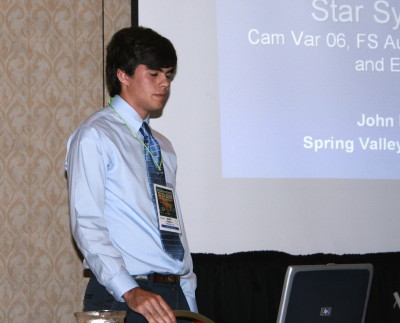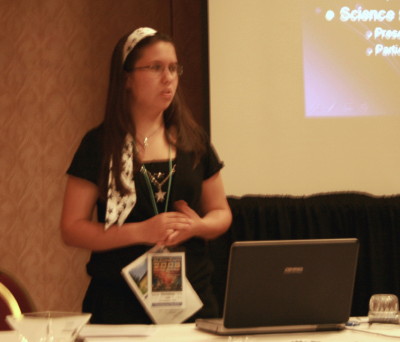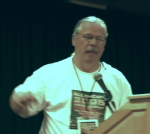The 2008 National Young Astronomer Award
 Shown at the left is John Hodge II, the 2008 National Young Astronomer Award winner who is giving the audience details of his project. John created and analyzed light curves of catclysmic variable star systems. In the fall of 2005 he used a 12 inch Meade LX200 telescope and ST7 CCD camera to obtain his images. The following year he did a more detailed study using different stars and a more complex mathematical analysis.
Shown at the left is John Hodge II, the 2008 National Young Astronomer Award winner who is giving the audience details of his project. John created and analyzed light curves of catclysmic variable star systems. In the fall of 2005 he used a 12 inch Meade LX200 telescope and ST7 CCD camera to obtain his images. The following year he did a more detailed study using different stars and a more complex mathematical analysis.
His interest in astronomy was sparked by his father who is an amateur astronomer. He was participating in a magnet program at his high school which required a detailed research project. He contacted Dr. Joseph Patterson at Columbia University who suggested several ideas. He chose cataclysmic variable star systems after some inital research.






 Christine Lee, The 2008 Jack Horkheimer Award winner, is making a presentation about the “Galaxy Zoo” program at this years ALcon. Christine is a volunteer for the Galaxy Zoo project which is classifying millions of galaxies obtained with Sloan Deep Sky Survey telescope. She is a member of the Rose City Astronomers in Portland, Oregon. Christine is a very active club member who has made presentations about science, astrophysics, galaxies, and other science topics. She is currently grinding a 6 inch mirror at a club workshop.
Christine Lee, The 2008 Jack Horkheimer Award winner, is making a presentation about the “Galaxy Zoo” program at this years ALcon. Christine is a volunteer for the Galaxy Zoo project which is classifying millions of galaxies obtained with Sloan Deep Sky Survey telescope. She is a member of the Rose City Astronomers in Portland, Oregon. Christine is a very active club member who has made presentations about science, astrophysics, galaxies, and other science topics. She is currently grinding a 6 inch mirror at a club workshop.
 he Astroleague 2008 conference/expo is now in progress. Brian Butcher, president of the Des Moines Astronomical Society, welcomed participants to the conference this morning.
he Astroleague 2008 conference/expo is now in progress. Brian Butcher, president of the Des Moines Astronomical Society, welcomed participants to the conference this morning.